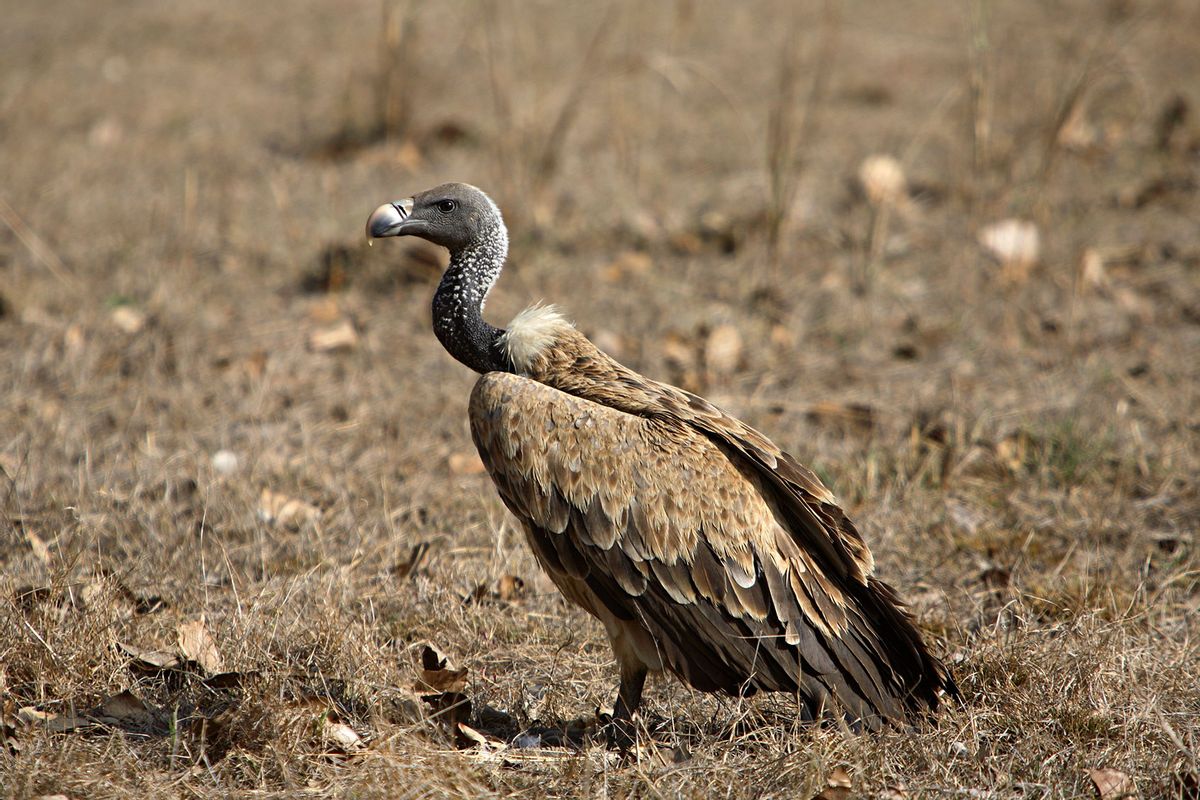Beauty may be in the eye of the beholder, but it’s fair to assume that vulture looks are an acquired taste. The hook-beaked, scrawny-necked and chunky-bodied birds were immediately described as “disgusting” by English biologist Charles Darwin, although his revulsion was also due to the vultures’ diet of dead animals. Yet that same stomach-churning tendency also causes vultures to be indispensable to human ecosystems, since the rotting carcasses contain dangerous diseases that could spread to humans if not ingested by more iron-stomached scavengers.
Margalida referred to vultures as “the most efficient species at locating and disposing of carrion.”
In fact, a recent study in the journal American Economic Review revealed that the unintentional decimation of India’s vulture population has had tragic consequences for nearby humans. Scientists estimate that their near-disappearance on the subcontinent nearly two decades ago — an unintentional byproduct of human activity — has led to more than half a million excess deaths.
“Our study provides strong evidence that the anecdotal reports of a public health crisis following the collapse of vultures were capturing a true signal: human health deteriorated following the collapse of the vultures,” study lead author Dr. Eyal Frank of the University of Chicago told Salon. “Before our study, there were anecdotal reports and claims, some back-of-the-envelope calculations about the potential magnitude of the effect, but our study uses annual district level data to quantify these impacts, and manages to reject other alternative explanations for the increase in mortality we observe.”
Frank and fellow University of Chicago professor Anant Sudarshan classified “district” as any high or-low-suitability area for affected vulture species, then analyzed the existing data to compare all-cause human mortality rates in those districts over the past two decades. “Before the collapse of vultures, there was no systematic difference in how those two groups were trending,” Frank said. “After vultures collapsed, we observe that the all-cause death rate in the high-vulture-suitability districts diverged from the low-vulture-suitability districts. By 2000, when vulture populations were effectively at their new population levels (less than 5% of their original population levels), we see that the divergence stabilizes.”
The collapse occurred because of indirect actions from the agricultural industry, specifically farmers treated their cattle with an anti-inflammatory medicine, called diclofenac, that proved highly toxic to vultures. Even worse, a generic version had become increasingly popular, meaning that vultures regularly were poisoned by dead animals exposed to the pharmaceutical. The new study found other indicators that this drug’s presence played a role in the current ecological crisis.
“We also report results that demonstrate that water quality deteriorated in the high-vulture-suitability districts, and that at the national level, there was an increase in the sales of rabies vaccines — consistent with the two main mechanisms highlighted by ecologists and public health experts,” Frank said.
Want more health and science stories in your inbox? Subscribe to Salon’s weekly newsletter Lab Notes.
“Even though there are options to substitute for the vultures in the form of building incinerators or burying the animals, those were not implemented because they are prohibitively expensive.”
Dr. Antoni Margalida, who was not involved in the study but is an expert in conservation biology at the Spanish National Research Council, observed that the new research “demonstrates the cascading effects that the virtual disappearance of one or more species that provide important ecosystem services can have. In this case, the important regulatory service provided by vultures through carcass disposal.”
Margalida referred to vultures as “the most efficient species at locating and disposing of carrion,” which is why ecosystems suffer so seriously when their populations go down. Yet they are not the only scavengers upon which humans rely for our own survival.
“The results in our study apply not just to vultures, but to any scavenging species that performs the same function at a similar level of efficiency,” Frank said, adding that vultures are arguably the most efficient scavengers out there. “We know that dogs and rats will grow in numbers and imperfectly substitute for vultures because they do not consume the carrion down to the bone as vultures do.”
In fact, vultures are so efficient at ridding an ecosystem of all excess material that the ripple effects of their decline are often felt prior to them actually becoming locally or globally extinct.
“It is enough for the population level to decline sharply for the species to effectively be functionally extinct — as in, they’re no longer carrying out their role in the ecosystem,” Frank said. “Even though there are options to substitute for the vultures in the form of building incinerators or burying the animals, those were not implemented because they are prohibitively expensive.”
Even though vultures are not as widely beloved as more attractive species like panda bears and tigers, Frank suggested that “we might be missing out on other less charismatic species who are incredibly important in terms of their contributions to human well-being.”
After researching India’s ecosystem before and after it was full of vultures, Frank has no doubt that humans need vultures even if we do not like having them around.
“More broadly, our study contributes to our understanding of how big the benefits that vultures provide in setting where they play a large role in removing dead animals from the environment,” Frank said. “Our findings highlight that by reducing the amount of carrion in the environment, humans benefit from vultures in meaningful ways, such as having better public health.”
